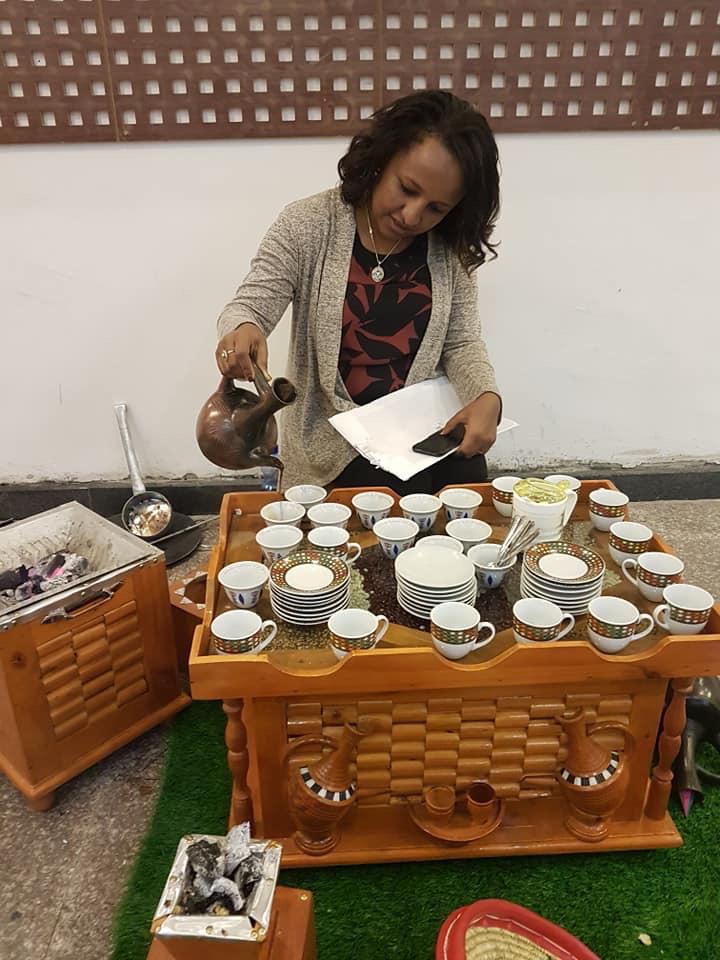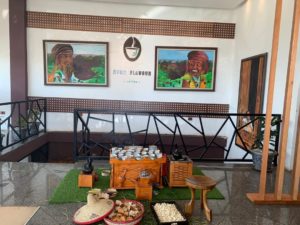Facilitating Women’s Empowerment in Ethiopian Coffee Sector: Interview with Meseret Desta
Nowadays women are becoming more and more visible in traditionally male-led coffee sector. Combatting gender inequality issues is included into the sustainability agenda of many actors involved, such as producers, traders, roasters, certifications, governments and NGOs. 4C also stands for gender equality and actively contributes to the improvement of social and environmental practices. We talked to Meseret Desta, CEO of Green Bean Agro-Processing PLC, who is seeking 4C certification for Godere Coffee, named after the specific place in GAMBELA region where it is produced – Godere Woreda.
What is your coffee story? Could you tell us more about your company?

Afro-Tsion Construction PLC, which is one of the largest general contractors in Ethiopia led by my brother, was looking for diversification opportunities and decided to invest into local coffee, as the region has a great potential with regards to climate and soil conditions. I became responsible for the project and coffee turned into my absolute passion. Not only the great potential of Ethiopian coffee attracted me, but also women involvement and social impact which could be generated via working in this sector. Together with my sister, we now lead Green Bean Agro-Processing PLC which started exporting in 2017. We, Ethiopians, are also great cof
fee drinkers on our own.
That is why it is my pleasure to also be a general manager of coffee shop “Afro-Flavor Café” with subtle goal to provide a place for women to meet and exchange their experiences.
What does a coffee industry look like for a woman in Ethiopia? What are the main challenges faced by Ethiopian female coffee farmers?
There are several challenges woman faces. It all starts with men being in charge of decision-making processes. Then comes the issue of having land ownership. This is a rare case that women actually own the land, they do not have a possibility to personally benefit from it and often have to look for a male who could support them. Another problem is access to information and market knowledge. Women commonly lack education and trainings to truly grasp the market opportunities and make use of them. Entering marriage in young age and being responsible for the household leaves them little time to educate themselves. So, I would say we are facing several main issues: decision-making, land ownership and lack of knowledge. Additionally, there is not enough support from the outside due to lack of finance for initiatives supporting Ethiopian women in coffee. We need to empower women to give them better opportunities to realise themselves in coffee business.
Godere Coffee is owned by women. You describe the experience of coffee as “a combination of the preservation of nature, the sweat and passion of strong women and the love for the berry”. Could you tell us more about the strong women in your company? How many women are involved into producing coffee?
 International Women’s Coffee Alliance’s (IWCA) studies demonstrate that women in Ethiopia do 70% of work in the coffee value chain, including harvesting, washing and sorting coffee cherries as they tend to be more careful than men, as well as roasting and brewing. Men mostly step in when we talk about loading and selling the coffee. We try to contract more female farmers, although it is very difficult to find farms owned by women, and employ more women in general. For this reason, we are also looking into further areas, except for coffee, which can generate impact, for example, spices or honey: women could be sole owners of their beehives.
International Women’s Coffee Alliance’s (IWCA) studies demonstrate that women in Ethiopia do 70% of work in the coffee value chain, including harvesting, washing and sorting coffee cherries as they tend to be more careful than men, as well as roasting and brewing. Men mostly step in when we talk about loading and selling the coffee. We try to contract more female farmers, although it is very difficult to find farms owned by women, and employ more women in general. For this reason, we are also looking into further areas, except for coffee, which can generate impact, for example, spices or honey: women could be sole owners of their beehives.
How does Godere Coffee contribute to improving the lives of its female coffee growers?
We maintain long-term relationships with farmers and pay a price premium to ensure that our women can have a decent income. We also organise trainings and other capacity-building activities. Our aim is to educate women not only on technical side, but also explain the true value of the farm and empower them to make decisions on their own.
You are also a president of Ethiopian Women in Coffee (EWiC) in Ethiopia. How does EWiC help to promote gender equality and empower women in the Ethiopian coffee sector?
EWiC was legally established in 2016 to benefit women in the coffee value chain by sharing information about the sector, providing capacity building and trainings, creating supply chain and a networking environment, where women can share, support and learn from each other. Our alliance has 44 members – all formidable businesswomen. EWiC is also one of the 23 chapters of IWCA. It is also vital to further increase visibility of women in the sector. In order to achieve this, we participate in national and international expos and policy dialogues. We have been successfully developing and enabling women in coffee to contribute to the growth of the coffee sector in Ethiopia. People need to realise that if women get help and become stronger, the whole economy will grow and benefit from it.
What are the biggest challenges EWiC is currently experiencing?
We are talking about financing and human resources for training and capacity building. There is a great need in partnerships of both kinds. We are constantly looking for trainers who have solid experience in working with women in agriculture and understand all the pitfalls. We have 44 members, but this is not enough to cover the whole scope of work and reach out to every woman in Ethiopia. Additional problem is that we do not have a common facility to meet and conduct trainings, but this problem could be solved easier than the first two. At EWiC, we believe that partnerships are key to tackle many challenges we are facing in the coffee industry, such as recognition and inclusion of as many women as possible. Over the past three years, we have been able to create bigger impacts by working closely with international and local partners. Partnering with us means supporting us to realize our vision and, on a larger scale, promoting Ethiopian coffee and culture to the world market.
4C also stands for gender equality and actively contributes to improvement of social and environmental practices in the coffee sector. When did you first hear about 4C?
In November 2019, we participated in training in Germany and had a chance to visit 4C headquarters.
Could you tell us a bit more about what motivated / inspired you to pursue 4C certification for your coffee?
Our mission is to produce, process and export top quality Ethiopian green coffee beans in a sustainable way. We want to make sure that our work is environmentally friendly. As our farms are close to the UNESCO protected forested area, it is of special importance. 4C uses innovative tools, such as GRAS (Global Risk Assessment Services) tool to track the land use and biodiversity change. This would enable us to ensure that we are doing the right thing.
What are your long-term goals in the coffee industry and how can 4C help you achieve those?
We would love to increase the volume of coffee we harvest and do it sustainably, implementing the best practices, helping smallholders and increasing productivity of our farms. Here we need 4C’s help to ensure that social and environmental aspects are in line with sustainable development and provide a credible sign of our commitment, increasing stakeholder trust in us. We hope to improve our visibility and access local and international markets, highlighting that our coffee is good for people and planet. Apart from that, it would be great to increase women involvement and achieve bigger impact in the empowerment area, working with international and local partners.